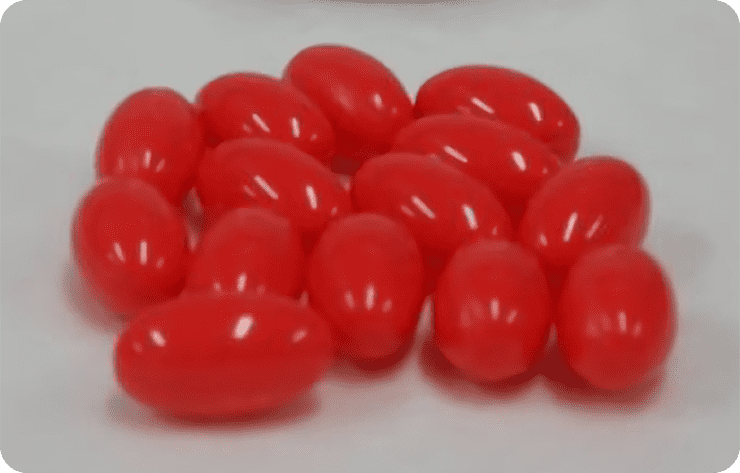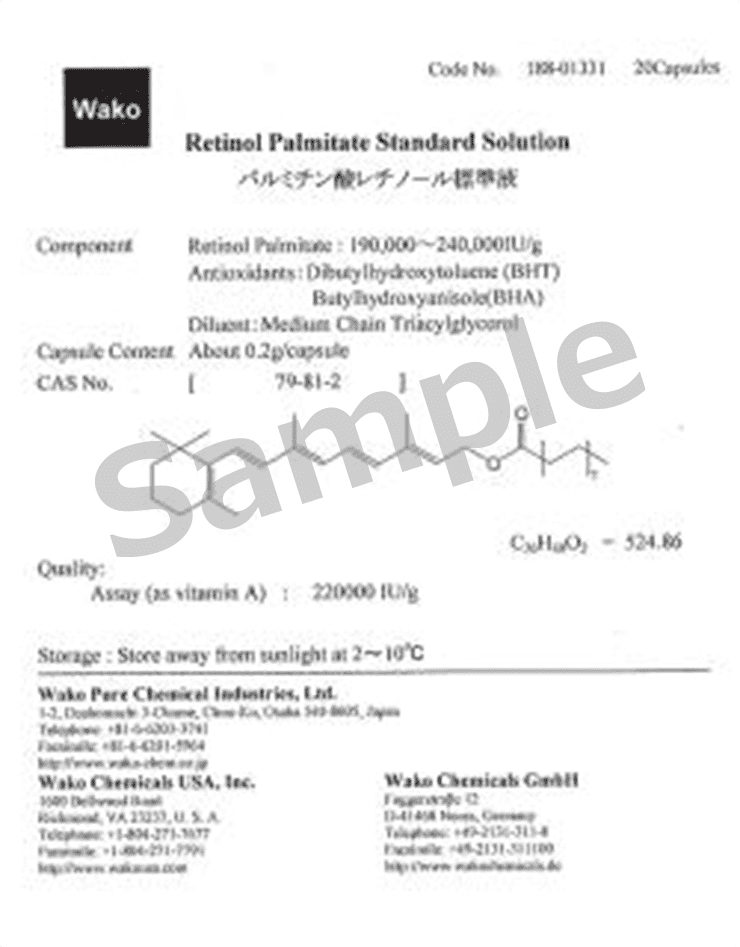Vitamins
Vitamin A is abundantly contained in foods as β-carotene (a class of carotenoids). β-Carotene has a function to suppress the generation of reactive oxygen species and remove it.
Vitamin E has a function to suppress the production of lipid peroxides in cells in addition to antioxidant effects.
Vitamin C also has a function to suppress the production of lipid peroxides.
In addition to the above, some of the compounds called vitamin-like active substances,*1 which are not strictly classified as vitamins, have antioxidant effects, such as coenzyme Q10.*2
Fujifilm Wako supplies a wide range of reagent groups related to vitamin analysis that can be used for these analyses.
*1 Substances that do not meet the definition of vitamins but have physiological effects similar to vitamins.
*2 Referenced from Ministry of Health, Labour and Welfare website
Standard Retinol Palmitate solution

Vitamin A is a general term for retinol, retinal, and retinoic acid. It functions to maintain the health of the mucous membranes of the eyes and skin and to strengthen resistance. According to the Standard Methods of Analysis in Food Safety Regulation, HPLC is used for the analysis of vitamin A, and retinol palmitate, which is a stable derivative, is used as the standard.
This product contains a small amount of retinol palmitate in capsules. It can be used in a fresh state at any time without concern for oxidation during storage.
Features

✔ Available in soft capsules, easy-to-use
A small amount is contained in capsules to prevent oxidation.
It can be used in a fresh state at any time without any waste left over.
✔ Measured value of retinol palmitate content available
An explanation sheet describing the HPLC purity and the content of retinol palmitate in the solution (International System of Units) is attached to the product.
Application

Product specifications
- Capsule content
- Approx. 250 mg/capsule
- Component
- Retinol Palmitate 190,000 – 240,000 IU/capsule*
*Containing antioxidant agent/diluent
How to use
Open the gelatin capsule with a sharp knife and push out the contents before use.
Acid Phosphatase for vitamin B1/B2 determination
This product contains various enzymes produced by yellow koji mold (Aspergillus oryzae).
During the quantification of vitamin B1 or B2, by utilizing its high phosphatase activity, it can be used for converting the vitamin from conjugated forms to free forms.
The enzymes are the same as those of Taka-Diastase U, which has conventionally been used for the quantification of vitamins B1 and B2.
How to use
Preparation of enzyme solution
Dissolve approximately 1 g of this product in 100 mL of purified water or buffer solutionbefore use. Adjust the pH to approximately 4.5, allow to stand in a cool place for some time,filter or centrifuge, and use the supernatant.
Reaction with sample
Extract and prepare the sample so that the content of vitamin B1 or B2 is approximately 10 μg.
If the sample is a fluid extracted from dried yeast or vegetable tissue (such as soy), add 0.5 to 1 mL of 1% solution of this product and incubate at 40℃ for approximately 5 hours.
If the sample is a homogenate of animal tissue (pork, pig liver, etc.), add approximately 10 mL of 1% solution and incubate at 40℃ for approximately 10 hours.
Note
The above are examples of general use.
The method varies depending on the type of sample and the content of conjugated vitamin B1 or B2. Examine the conditions as needed.
Product List
- Open All
- Close All
Water-soluble Vitamins Vitamin B1
Water-soluble Vitamins Vitamin B2
Water-soluble Vitamins Vitamin B3
Water-soluble Vitamins Vitamin B5 Related Compounds
Water-soluble Vitamins Vitamin B6
Water-soluble Vitamins Vitamin B7
Water-soluble Vitamins Vitamin B12
Water-soluble Vitamins Vitamin C
Fat-soluble Vitamins Vitamin A
Fat-soluble Vitamins Vitamin D2
Fat-soluble Vitamins Vitamin D3
Fat-soluble Vitamins Vitamin E
Fat-soluble Vitamins Vitamin K1
Vitamin-like Active Substances
For research use or further manufacturing use only. Not for use in diagnostic procedures.
Product content may differ from the actual image due to minor specification changes etc.
If the revision of product standards and packaging standards has been made, there is a case where the actual product specifications and images are different.



